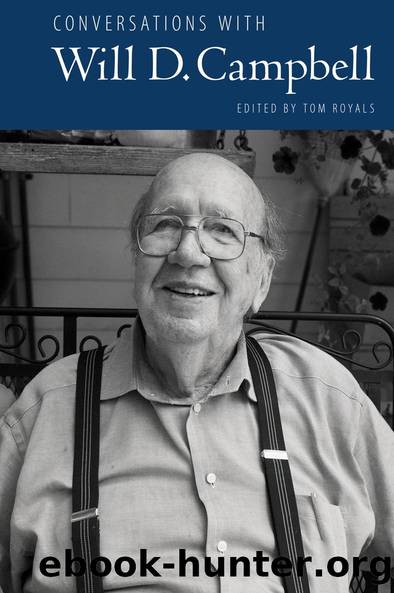Conversations with Will D. Campbell by Tom Royals

Author:Tom Royals [Royals, Tom]
Language: eng
Format: epub
ISBN: 9781496818140
Barnesnoble:
Publisher: University Press of Mississippi
Published: 2018-02-21T00:00:00+00:00
Will Campbell
Frye Gaillard / 1997
From Oxford American, issue 19 (Winter 1997). Reprinted with permission of Frye Gaillard, writer in residence at the University of South Alabama.
Frye Gaillard: What led you to write about Duncan Gray?
Will Campbell: There are few heroes left in America. Duncan Gray Jr. is one of mine. Heâs such an exceedingly modest, unassuming character, almost meek, and yet, on the night of the riot with a dangerous, exploding mobâtwo people shot deadâhere was this fellow with his turned-around collar climbing up on the Confederate monument, pleading for calm. When I asked his wife where he got this courage, she said, âWill, thatâs just what a priest does. That morning he administered the sacraments during service at the church. That was part of his job. And when there is trouble, a priest is a peacemaker. Thatâs a part of his job also.â
Frye Gaillard: In your book, you weave Duncan Grayâs story through the story of a group of young men from Ole Miss who left their studies to go fight in the Civil War. Talk about the connectionâhow in your mind the two stories are related.
Will Campbell: I was struck by the irony of history. Company A of the Eleventh Mississippi Infantry Regiment became known as the Mississippi Greys. That nameâGrey with an Eâwas one letter different from Duncan Grayâs, and when they stacked their books and went off to war, their point of departure was precisely the place where Gray with an A pleaded for calm during the riots at Ole Miss. The Mississippi Greys never came home. Not a one of them. They sustained 100 percent casualties at the Battle of Gettysburg, which has been called the high-water mark of the Confederacy. Everyone knew after that how the war was going to end. Everyone knew the Confederacy was doomed and, with it, the institution of slavery. And when Duncan Gray went around and asked for the guns and the gasoline to be put aside, the Molotov cocktails, the rioting that he was trying to stop was the high-water mark of massive resistance to Brown v. Board of Education, the landmark case for desegregation. The next week, the businesspeople of Mississippi, the same people who had put Governor Ross Barnett in office and given their tacit approval to resistance, issued a statement saying that compliance with Brown v. Board must be done. They said, âWe will not allow violence to be the means of conflict.â So I was writing about those two high-water marks in our struggle with what Gunnar Myrdal called âthe American Dilemma,â the issue of race.
Frye Gaillard: Have the waters receded where the racial issue is concerned?
Will Campbell: It depends on which day you ask me that question. I cannot agree with those who say things are no better than they were in 1954. What some of the people, who say that, are seeing is that black Americans are now free to state their grievances and to strike back, sometimes even physically. âWhy are they so angry?â Thatâs the question you hear, and itâs always âthey.
Download
This site does not store any files on its server. We only index and link to content provided by other sites. Please contact the content providers to delete copyright contents if any and email us, we'll remove relevant links or contents immediately.
| Diaries & Journals | Essays |
| Letters | Speeches |
The Rules Do Not Apply by Ariel Levy(4969)
Bluets by Maggie Nelson(4556)
Too Much and Not the Mood by Durga Chew-Bose(4348)
Pre-Suasion: A Revolutionary Way to Influence and Persuade by Robert Cialdini(4232)
The Motorcycle Diaries by Ernesto Che Guevara(4098)
Walking by Henry David Thoreau(3962)
Schaum's Quick Guide to Writing Great Short Stories by Margaret Lucke(3381)
The Daily Stoic by Holiday Ryan & Hanselman Stephen(3321)
What If This Were Enough? by Heather Havrilesky(3311)
The Day I Stopped Drinking Milk by Sudha Murty(3197)
The Social Psychology of Inequality by Unknown(3031)
Why I Write by George Orwell(2953)
Letters From a Stoic by Seneca(2798)
A Short History of Nearly Everything by Bryson Bill(2698)
A Burst of Light by Audre Lorde(2607)
Insomniac City by Bill Hayes(2558)
Feel Free by Zadie Smith(2479)
Upstream by Mary Oliver(2390)
Miami by Joan Didion(2368)
